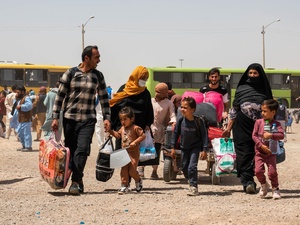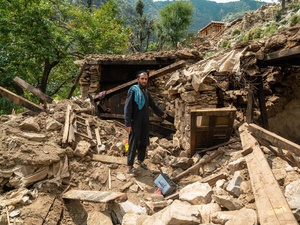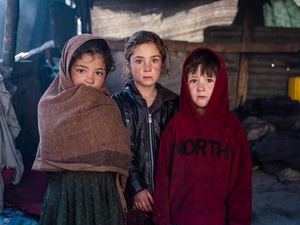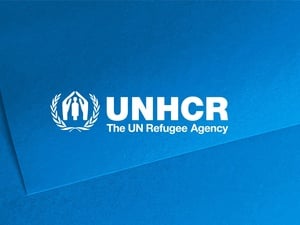Refugee camps on Afghanistan's borders pose serious security risks
Refugee camps on Afghanistan's borders pose serious security risks

Afghan women and their children at the Killi Faizo facility in Pakistan.
GENEVA, Nov. 6 (UNHCR) - A number of refugee camps inside Afghanistan continue to pose considerable security concerns for both their inhabitants and aid workers, the U.N. refugee agency said Tuesday.
Meanwhile, the Iranian Red Crescent Society and other sources reported that up to 1,500 Afghans are camping in the open air near the Makaki Camp in Afghanistan's Nimroz Province. The Afghans have not been allowed to enter the camp, which IRCS says is at full capacity with as many as 5,000 refugees living in about 1,000 tents.
The U.N. agency said Tuesday security considerations made it difficult if not impossible to work in several of the camps inside Afghanistan. "The presence of armed fighters in or near camps present an obvious danger to the displaced," Kris Janowski, a UNHCR spokesman, said at a news briefing.
A 12-year-old boy was shot Monday in the Makaki Camp, one of the sites controlled by the Taliban. "This illustrates just how volatile and dangerous the situation is in that camp," Janowski said.
He added that while UNHCR would like to help the refugees inside Afghanistan, "the Taliban are sending mixed signals." Janowski said while UNHCR offices inside Afghanistan are occupied by the Taliban and vehicles have been appropriated, the Taliban Ambassador to Pakistan, Mullah Abdul Salam Zaeef, has urged the world body to help his country.
"Refugees are stuck in Taliban controlled areas, completely subject to Taliban power and abuse," Janowski said in answer to a question. "Anything can happen. They [the refugees] can be conscripted or placed in the vicinity of military facilities."
"This is not an area where they can be kept safe," he added.
The refugee agency has also expressed concern about other camps close to the Pakistan, Iran, and Tajikistan borders that are controlled either by Taliban or Northern Alliance forces.
The UNHCR spokesman said that while the borders with Afghanistan are officially closed, they are also porous, with significant numbers of people able to cross. "The problem is that these people are going into Pakistan and then trying to hide," Janowski said. "They are therefore being deprived of aid."
UNHCR said Tuesday that some 135,000 refugees have entered Pakistan from Afghanistan since September 11. Of these, at least 75,000 are believed to have entered North-West Frontier Province, with another 60,000 arriving further south in Baluchistan Province.
With the exception of the 2,400 people at the Killi Faizo site on the Pakistani side of the border, the vast majority of the refugees are housed in either some of the 203 old refugee camps or in private houses with relatives in Peshawar and Quetta. Still others, according to UNHCR officials, are believed to have moved into cities such as Karachi or Islamabad, the capital.
Monday night Pakistani authorities finally allowed some 300 women and children to enter Killi Faizo, sheltering them in two large tents normally used as a waiting area and for registration rather than placing them with the other refugees. The 103 men in the group were unable to enter the camp at all. Local authorities said they were waiting for clearance from Islamabad before allowing this group of refugees to be properly admitted.
Thirteen children who do not have mothers were brought to the camp by their fathers and left with the other women and children. The men then had to leave the site.
High Commissioner Ruud Lubbers has consistently urged Pakistan, Iran and the other countries in the area to open their borders. Pakistani authorities in particular argue that their country is already host to more than two million Afghans and complain that they have received little help from the international community.









